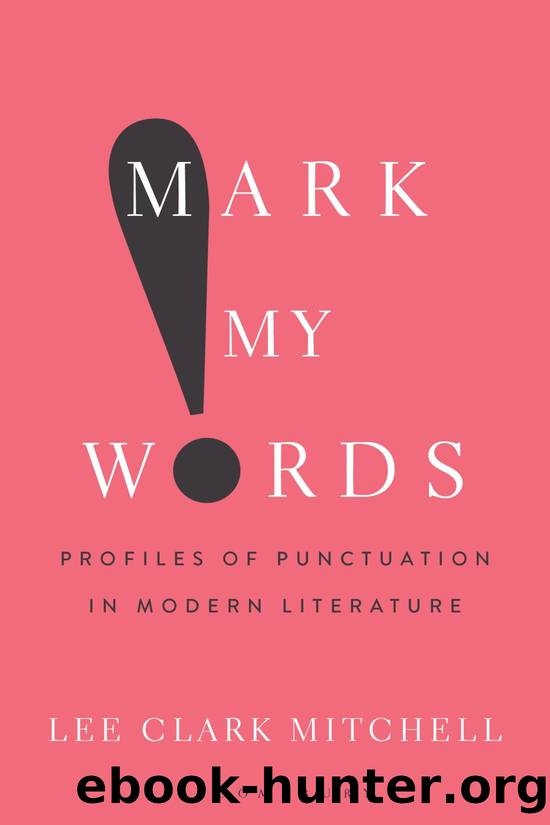Mark My Words by Mitchell Lee Clark;

Author:Mitchell, Lee Clark;
Language: eng
Format: epub
Publisher: Bloomsbury Publishing Plc
7
Enjambment: Cummings, Williams, Giovanni
Surprising as it sounds, prose may well be more readily left unpunctuated than poetry, though poets have a longer modern history of experimenting with an absence of marks. And when they do, it is often because line breaks serve as a form of disguised punctuational guide or, in Charles O. Hartmanâs words, âas a kind of master punctuation markâ (Hartman 153). Arguably as well, the less punctuation poetry exhibits, the less simply verbal it seems to become and the more its impact verges on the visual, which may explain the allure of shaped or pattern poems (sometimes known as visual or concrete poetry) that burst into prominence in the mid-twentieth century. Typographical marks convey meaning in poems as much ocular as rhetorical, whose effect is thereby largely lost when read aloud. Yet short of such experiments, poets often enjamb lines or drop capitalization and periods, evincing poetic statements with neither pauses nor caesuras.1
A trio of American poets has been drawn to this structural possibility out of a shared resistance to conventional modes, though for reasons that curiously happen to be diametrically opposed. E. E. Cummings, William Carlos Williams, and Nikki Giovanni each embraced the freedom of abandoning punctuation, with its assorted implications, and in the process offer a sharp contrast not only to other figures in this study but distinctively to each other. Cummings turned from conventional punctuation as a means of exploring what otherwise seemed hidden, the visual realms of poetry; Williams did so out of a radical reconception of the relation between image and referent; Giovanni did so out of a desire to perfect an exhortatory, distinctively oral mode. Yet each of these three anticipated the wonderfully fruitful ambiguities generated by a lack of punctuation in poems, especially with regard to agency and perspective. Indeed, Cummings resisted marks so assiduously that he published under the sobriquet e e cummings, while Giovanni reframed stanzaic conventions in an effort to proclaim a distinctive black consciousness. Along with Williams, their poems establish borders where punctuation might forcefully seem to detract from rather than add to a poetic resonance. And from this perspective, it is as if Cummings and Williams, who each admired the other immensely, helped prepare the way for Giovanniâs success in an entirely different formal venture.
Cummings is usually associated with the modernist turn toward free-form poetry, following rhythms of natural speech to delight in whimsical possibilities of verbal and visual play. Indeed, the visual at times seemed to overtake the verbal, as Marianne Moore exuberantly proclaimed: âThe physique of the poems recalls the corkscrew twists, the infinitude of dots, the sumptuous perpendicular appearance of Kufic script . . .â (Moore 47).2 Over time, he would even abandon the conventional syntax and capitalization of his early stanzaic poems, often in celebrating a spirit of carpe diem.
In his celebrated poem âsince feeling is first,â from his second collection, Is5 (1926), Cummings expresses a belief in the primacy of emotion over reason, part of a perfectly recognizable romantic tenet:
since
Download
This site does not store any files on its server. We only index and link to content provided by other sites. Please contact the content providers to delete copyright contents if any and email us, we'll remove relevant links or contents immediately.
Harry Potter and the Prisoner of Azkaban by J K Rowling(3420)
The Sentinel (Jack Reacher) by Lee Child & Andrew Child(3242)
Harry Potter and the Prisoner of Azkaban by Rowling J K(3035)
The Tales of Beedle the Bard by J.k.rowling (eng)(2672)
Marauder (The Oregon Files) by Clive Cussler & Boyd Morrison(1894)
Dungeon Crawler Carl by Matt Dinniman(1868)
Better Off Dead by Lee Child & Andrew Child(1848)
The Gate of the Feral Gods: Dungeon Crawler Carl Book 4 by Matt Dinniman(1687)
The Other Emily by Dean Koontz(1628)
Migrations by Charlotte McConaghy(1575)
Gild (The Plated Prisoner Series Book 1) by Raven Kennedy(1575)
The Girl and the Mountain by Mark Lawrence(1556)
A Desolation Called Peace by Arkady Martine(1466)
Ruthless Empire (Royal Elite Book 6) by Rina Kent(1452)
Near the Bone by Christina Henry(1436)
The OP MC: God of Winning by Logan Jacobs(1401)
Fable: A Novel by Adrienne Young(1398)
Mark Z. Danielewski's House of Leaves by Mark Z. Danielewski & Johnny Truant(1383)
The Captive by Fiona King Foster(1365)
